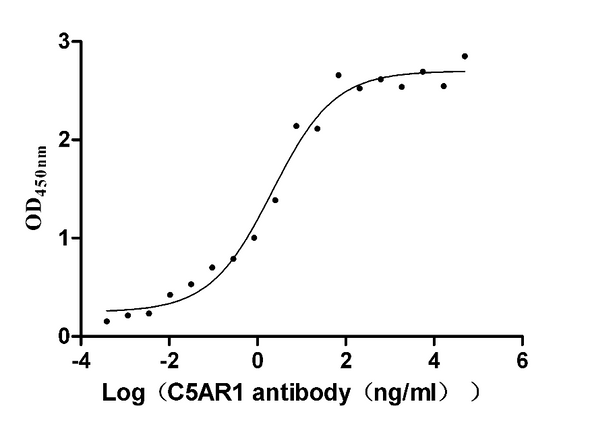Recombinant Human C-C chemokine receptor type 8 (CCR8) - VLPs (Active)
- SKU:
- GEN-MP004847HU
- Availability:
- In Stock & Available In 3 to 7 business days
Description
Recombinant Human C-C chemokine receptor type 8 (CCR8) - VLPs (Active) from Gentaur in Stock & Available in 3-7 business days.
Recombinant full-length human CCR8 protein was expressed by the intact DNA sequence of the human CCR8 in mammalian cells. This recombinant CCR8 protein was fused with a 10xHis-tag at the C-terminus. It contains less than 1.0 EU/ug determined by the LAL method. The CCR8 protein is biologically active as it can react with the mouse anti-6xHis monoclonal antibody and anti-CCR8 recombinant antibody, respectively. Its VLP-like structure was observed and confirmed by TEM. This recombinant CCR8 protein is highly immunogenic because it carries viral protein.
Past studies have shown that the CCR8 protein is mainly expressed on monocytes, Th2 cells, and Treg cells. Many basic studies have also proved CCR8 plays an essential role in the biological processes of lymph node migration of monocyte-derived dendritic cells and Th2 cell-mediated type 2 inflammation. Researchers have found that CCR8 is a good biomarker of Treg cells at tumor sites and a potential tumor immune target. Subsequent studies found that the presence or absence of CCR8 does not affect the migration ability of Treg and its function in the tumor microenvironment. The development of CCR8-targeted monoclonal antibody drugs is expected to specifically inhibit the function of Treg at the tumor site and contribute to cancer treatment.
Research Areas: Cancer
Uniprot NO: P51685
Gene Names: CCR8
Species: Homo sapiens (Human)
Source: Mammalian cell
Expression Region: 1-355aa
Sequence: MDYTLDLSVTTVTDYYYPDIFSSPCDAELIQTNGKLLLAVFYCLLFVFSLLGNSLVILVLVVCKKLRSITDVYLLNLALSDLLFVFSFPFQTYYLLDQWVFGTVMCKVVSGFYYIGFYSSMFFITLMSVDRYLAVVHAVYALKVRTIRMGTTLCLAVWLTAIMATIPLLVFYQVASEDGVLQCYSFYNQQTLKWKIFTNFKMNILGLLIPFTIFMFCYIKILHQLKRCQNHNKTKAIRLVLIVVIASLLFWVPFNVVLFLTSLHSMHILDGCSISQQLTYATHVTEIISFTHCCVNPVIYAFVGEKFKKHLSEIFQKSCSQIFNYLGRQMPRESCEKSSSCQQHSSRSSSVDYIL
Protein Description: Full Length
Tag Info: C-terminal 10xHis-tagged (This tag can be tested only under denaturing conditions)
Mol. Weight: 42.2 kDa
Biological Activity: Measured by its binding ability in a functional ELISA. Immobilized human CCR8 at 5 μg/ml can bind Anti-CCR8 recombinant Antibody, the the EC50 is 11.13-17.29 ng/ml.
Endotoxin: Less than 1.0 EU/ug as determined by LAL method.
Form: Liquid
Buffer: PBS, pH 7.4, 6% trehalose
Notes: Repeated freezing and thawing is not recommended. Store working aliquots at 4℃ for up to one week.
Alternative Name/ Alias: (CC chemokine receptor CHEMR1) (CMKBRL2) (Chemokine receptor-like 1) (CKR-L1) (GPR-CY6) (GPRCY6) (TER1) (CDw198) (CKRL1) (CMKBR8) (CMKBRL2)
Purity: Testing in progress.


















